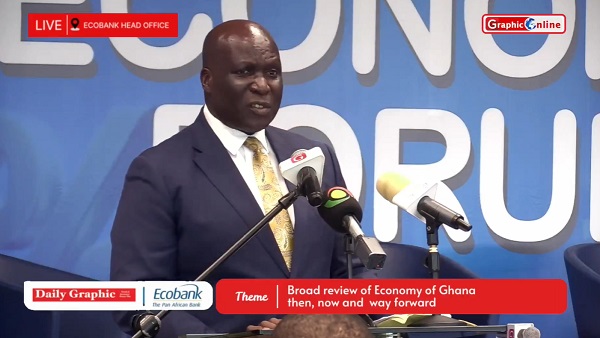The Ghanaian economy is showing renewed signs of recovery, but sustaining this progress will require consistent policy execution, deep structural reforms and collective national resolve.
This was the key message from Mr Osei Gyasi of the Bank of Ghana’s Governance Department, who delivered an address at the inaugural Daily Graphic/Ecobank Ghana Economic Forum held in Accra today (May 28, 2025)
Speaking on behalf of the central bank, Mr Gyasi said the economy was gradually rebounding from years of cyclical crises and structural vulnerabilities, bolstered by tight monetary policy, improved external sector performance, and ongoing reforms under the International Monetary Fund programme.
He praised the organisers for creating a platform for open and candid discussion on the economy and challenged participants to use the forum as a springboard for co-creating a roadmap towards economic renewal.
Mr Gyasi said the signs of recovery were becoming more pronounced in 2025, with the cedi appreciating and reversing a 19.2 per cent depreciation recorded in 2024. Inflation, he noted, had moderated significantly from 23.8 per cent in December 2024 to 21.2 per cent in April 2025, aided by currency stability, tight monetary policy and improved supply-side conditions.
He cited a marked improvement in the external sector, with a strong current account surplus in the first quarter of 2025, driven by gold and cocoa exports.
Ghana’s gross international reserves reached $10 billion at the end of April—an all-time high—equivalent to 4.7 months of import cover. The country also posted a real GDP growth of 5.7 per cent in 2024, exceeding expectations, and is projected to grow by four per cent in 2025. These developments, Mr Gyasi said, have led to renewed investor confidence, culminating in an upgrade of Ghana’s credit rating by S&P from ‘selective default’ to ‘CCC+’.
However, Mr Gyasi cautioned that the progress made remains fragile. He said fiscal pressures, currency volatility, and the global economic environment still pose significant risks. He stressed the need for close policy coordination between monetary and fiscal authorities, noting that a single misstep could reverse the hard-won gains.

On monetary policy, he disclosed that the Bank of Ghana’s Monetary Policy Committee had unanimously voted to maintain the policy rate at 28 percent during its May 2025 meeting.
This, he explained, was a deliberate decision aimed at consolidating the gains made in bringing down inflation. He also announced a structural reform to the cash reserve ratio framework, requiring banks to hold reserves in the currency of their respective deposits—a move designed to enhance liquidity management and the effectiveness of monetary policy transmission.
Mr Gyasi acknowledged ongoing concerns in the banking sector, particularly relating to asset quality. He said the non-performing loan ratio stood at 23.6 per cent but dropped to 9 per cent when adjusted for provisions, indicating that banks are actively working to clean up their loan books. The banking system, he stressed, remains strong and well-capitalised, with a capital adequacy ratio of 15.8 per cent as of April 2025, well above the regulatory minimum of 10 per cent.
Looking ahead, Mr Gyasi argued that macroeconomic stability, while necessary, is not sufficient to reset Ghana’s economy. He called for a broader growth model that goes beyond reliance on gold and cocoa, urging greater investment in value addition, diversification, and strategic sectors such as agro-processing, light manufacturing, logistics, tourism, education and health.
He said these sectors have high potential for job creation, export expansion and innovation, but require targeted policy support and infrastructure investment.
He further highlighted the importance of tackling structural challenges such as limited domestic revenue mobilisation, weak public financial management systems, and governance gaps. According to him, Ghana’s economic transformation will depend not only on sound policy tools, but also on policy consistency, institutional reform, and commitment to transparency and the rule of law.
In his concluding remarks, Mr Gyasi acknowledged that the road ahead would be difficult but stressed that with courage, integrity, and collective effort, the goal of building a stable, sovereign and globally competitive Ghana was within reach.
He reaffirmed the Bank of Ghana’s commitment to prudent policy implementation and encouraged participants to ensure that the forum becomes a true catalyst for national economic renewal.
The forum, held at the Ecobank Head Office under the theme “A broad review of the economy of Ghana: Then, now, and the way forward,” also featured remarks from Presidential Advisor on the Economy, Seth Terkper, and PwC Ghana’s Tax Partner, Abeku Gyan-Quansah. Participants explored issues of monetary policy, taxation and fiscal discipline, with a focus on repositioning Ghana’s economy for long-term growth.
